Global Surgery
News
-
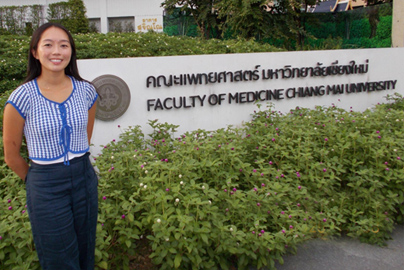 June 2025
June 2025Global Surgery Research on Financial Toxicity in Northern Thailand
Jade Tso, a rising fourth-year medical student at UC Davis School of Medicine and member of the ARC-MD (Academic Research Careers for Medical Doctors) program, has spent the past year in Thailand conducting research in global surgery. Through the UC Davis Center for Global Surgery and in conjunction with a fellowship with Harvard’s Program in Global Surgery and Social Change (PGSSC), Jade has led a project investigating financial toxicity (the detrimental impact that healthcare costs have on patients and their families) among patients undergoing cancer surgery in a major tertiary hospital in Chiang Mai.
Her work has focused on understanding the economic burden faced by patients and families navigating surgical care in the Thai healthcare system. By conducting mixed-methods research in partnership with local surgical teams and public health leaders at Chiang Mai Unversity, the team aims to generate data-driven recommendations to promote more equitable access to surgical care. This includes identifying both direct and indirect costs that contribute to catastrophic health expenditure for patients with cancer, coping mechanisms for financial distress, and potential solutions to financial toxicity.
While this year was just the beginning of a longer-term partnership between UC Davis, Chiang Mai University, and the Program in Global Surgery and Social Change at Harvard, the project has already resulted in several major deliverables. This includes a Ted talk given in April of 2025, in which Jade tied her own family’s experience with financial toxicity following her father’s surgery and patient stories from Chiang Mai and other research sites with current literature around what drives financial toxicity and how to address it. Preliminary results for this project have also been presented at the UC Davis Department of Surgery Research Symposium, the UC Davis Clinical and Translational Science Center Training Program Annual Scholar Symposium, and UC Davis Research Scientist Colloquium, and has been accepted to the American College of Surgeons Clinical Congress and the Society of Asian Academic Surgeons Annual Meeting.
Jade’s research year reflects her broader commitment to health equity, academic surgery, and addressing disparities in access to specialty care. She will return to UC Davis in June to complete her acting internships and will apply to general surgery residency in the fall. Her experience abroad continues to shape her vision for a future career in academic global surgery and surgical oncology, and she looks forward to continuing these collaborations for years to come.
-
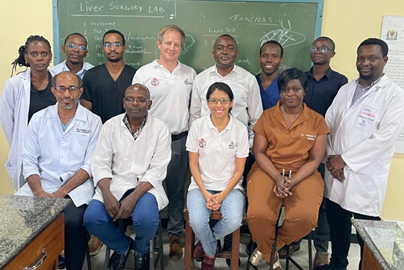 May 2025
May 2025Jeanine Justiniano Advances Global Health Through Research in Tanzania
Jeanine Justiniano, a general surgery resident at UC Davis Medical Center, recently completed a year-long Global Health Research Fellowship from the Fogarty International Center at the National Institutes of Health, in collaboration with the University of California Global Health Institute’s GloCal Fellowship.
The research took place in Tanzania, where she contributed to several projects in the field of surgical oncology. Justiniano focused on implementing a prehabilitation program aimed at enhancing liver surgical candidacy and increasing treatment rates for patients with hepatocellular carcinoma. Her efforts targeted a critical gap in surgical readiness and treatment outcomes at Muhimbili National Hospital, one of the region’s leading medical institutions.
As part of her commitment to sustainable surgical training, Justiniano also helped develop a low-cost, dry animal training model for liver surgery using bovine livers. This innovative model formed the basis of a simulation lab designed to provide hands-on surgical training for fellows and junior staff, improving technical skills in a resource-conscious manner and fostering long-term capacity building in the region. In addition to her primary research, Justiniano collaborated on several other projects involving the hospital’s multidisciplinary liver tumor board. She also mentored surgery residents and medical students, contributing to the development of multiple dissertation projects.
Justiniano credits much of her success to the mentorship and guidance of Cameron Gaskill, M.D., a surgical oncologist at UC Davis Medical Center, and Ally Mwanga, M.D., a surgical gastroenterologist and Head of the Department of Surgery at Muhimbili University of Health and Allied Sciences in Tanzania. Their expertise, support, and commitment to surgical education and global health were instrumental in shaping the direction and impact of her work.
Justiniano's work exemplifies a growing movement toward collaborative, cross-continental approaches to health care improvement. Her contributions reflect UC Davis Health’s mission to lead in transformative, globally-engaged research and training. Justiniano will be presenting her work at several medical conferences within the next year, including Tanzania’s National Liver Cancer Conference.
-
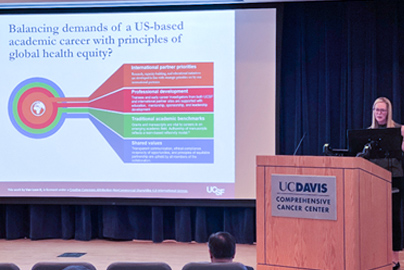 December 2024
December 2024UC Davis Comprehensive Cancer Center Hosts Inaugural Global Oncology Symposium
The UC Davis Comprehensive Cancer Center hosted its first Global Oncology Symposium on December 12, 2024, bringing together leading experts to advance the global fight against cancer through collaboration, research, and education.
In alignment with the National Cancer Institute’s mission to reduce the burden of cancer both domestically and internationally, the symposium served as a vital forum to explore existing global cancer efforts, address disparities in care, and launch new initiatives. Participants included clinicians, researchers, and global health advocates working across borders to improve cancer outcomes in low- and middle-income countries.
The event featured distinguished speakers from UC Davis and other institutes, and it covered a wide range of topics. Katherine Van Loon, M.D. the director of the Global Cancer Program at UCSF Health was the keynote speaker, she presented her work on improving cancer care in Tanzania, emphasizing long-standing partnerships with Muhimbili University of Health and Allied Sciences and the Ocean Road Cancer Institute. Her address underscored the importance of sustainable international collaborations in building oncology capacity and research infrastructure. Other speakers included Luis Carvajal-Carmona, M.D., Joel Levenson, M.D., and Jeffrey Hoch, M.D., who shared insights on cancer genetics, health systems strengthening, and global surgical oncology.
The Global Oncology Symposium served as a vital platform for knowledge exchange and collaboration, reaffirming UC Davis Comprehensive Cancer Centers’ commitment to addressing global cancer disparities. By leveraging insights gained from this event, UC Davis Comprehensive Cancer Center and its partners can work towards sustainable and impactful advancements in global oncology. -
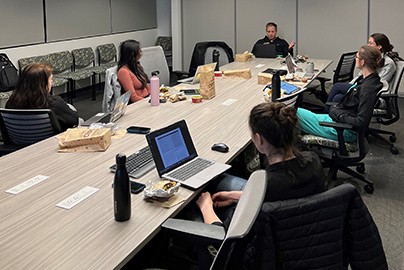 March 2024
March 2024Global Surgery Journal Club 2024
In March 2024, the Global Surgery Journal Club convened to explore pivotal papers shaping the landscape of global surgery. Cameron Gaskill, M.D. led an insightful discussion highlighting the following key papers:
1. Meara, John G et al. “Global Surgery 2030: evidence and solutions for achieving health, welfare, and economic development.” Lancet. This monumental paper presents a comprehensive vision for global surgery, outlining evidence-based strategies and solutions to achieve health, welfare, and economic development by 2030.
2. Abraham, Mackenzie N et al. “What is global surgery? Identifying misconceptions among health professionals.” sheds light on common misconceptions surrounding global surgery among healthcare professionals, emphasizing the need for clarity, and understanding in this critical field.
3. Quene, Tamlyn Mac et al. “Global surgery is an essential component of global health.” underscores the importance of integrating surgery into global health agendas, emphasizing its crucial role in addressing health disparities and achieving universal health coverage.
The discussion stimulated by these papers provided valuable insights into the challenges and opportunities in global surgery, highlighting the urgency of collective action to achieve equitable surgical care worldwide. -
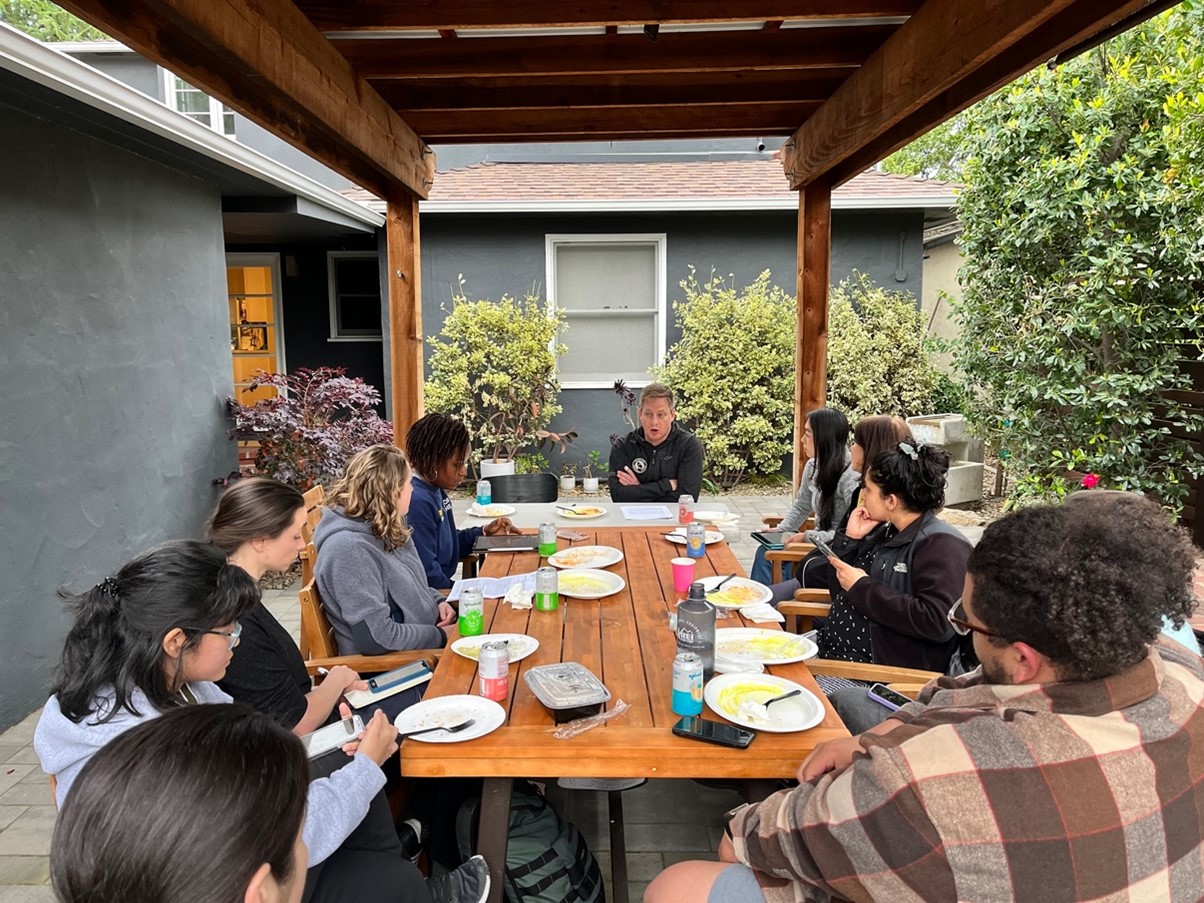 December 2023
December 2023The quarterly Global Surgery Journal Club
The quarterly Global Surgery Journal Club convened in December 2023 to delve into pressing issues surrounding breast cancer and optimizing cancer care delivery. Cameron Gaskill, M.D. facilitated a comprehensive discussion on the global macroeconomic burden of breast cancer and its implications for oncologic surgery, as well as the strategies for optimizing cancer care delivery through implementation science. Key papers discussed during the session included:
1. Ranganathan, Kavitha et al. “The Global Macroeconomic Burden of Breast Cancer: Implications for Oncologic Surgery.”
2. Adesoye, Taiwo et al. “Optimizing Cancer Care Delivery through Implementation Science.” -
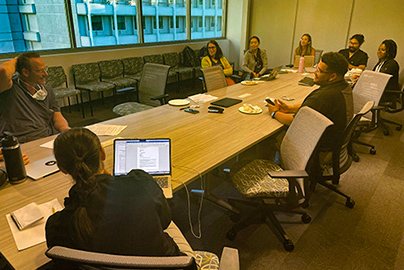 July 2023
July 2023UC Davis Health Center for global surgery journal club
Cleft Lip Repairs
The July quarterly Global Surgery Journal Club focused on topics around cleft lip repair in low- and middle-income countries. Travis Tollefson, M.D. led a didactic discussion on the issues around cleft lip repair in low resource settings, training local providers, building lasting collaborations, and the ethics of medical missions. Papers discussed at this session included:
- Costa et al (2015) on the use of telemedicine in cleft care.
- Schoenbrunner et al. (2018) on local surgeons’ perceptions of foreign volunteer surgeons participating in cleft lip missions.
-
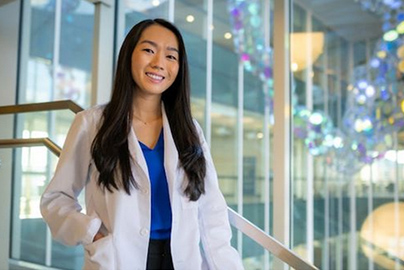 June 2023
June 2023Second year fellow and long-time global health enthusiast Jade Tso
Jade Tso, a third-year at UC Davis Health School of Medicine was recently interviewed on the American Medical Women's Association's "Health Equity and Reflection" podcast. In this episode, she highlights her experience with the UC Davis Center for Global Surgery, working with Cameron Gaskill, M.D. and Clinical Esperanza in Roatan, Honduras. Their project focuses on gastric cancer screening and capacity assessment for endoscopy. She also discusses her journey in global health working as a Program Manager for Advance Access & Delivery, doing community organizing with Partners in Health Engage, and conducting community-based research projects in Central and South America. Tune in to hear about Jade's views on being attorneys for the poor, being adaptable, and countering failures of imagination.
-
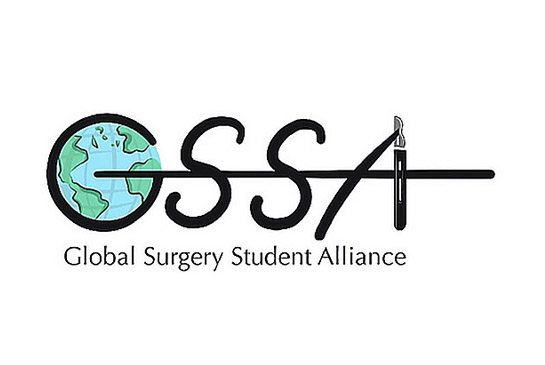 May 2023
May 2023Current State of Cancer Surgery in Low and Middle Income Countries
Presentation at UCSF Global Surgery and Health Equity
In collaboration with Global Surgery Student Alliance (GSSA), the UC wide Global Surgery and Health Equity course hosted Cameron Gaskill, M.D. for their inaugural lecture in the Global Surgery & Health Equity Elective. His lecture provided insights on surgical care, particularly cancer surgery in LMICs, highlighting the challenges and areas of actionable interventions. Furthermore, his elucidated the importance of a multidisciplinary collaborative approach in creating sustainable global surgery programs.
-
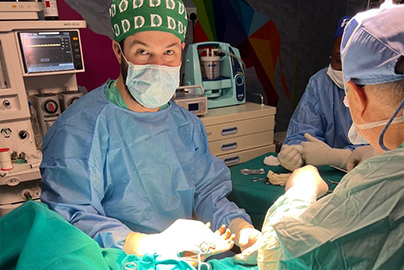 April 2023
April 2023Powelson developing collaboration in Zambia
Providing Burn and Plastic Surgery Care
Ian Powelson, M.D. traveled to Zambia for 2.5 weeks in April for an outreach trip. He spent half of his trip with Goran Jovic, M.D., observing and learning from a true master in the field of burn reconstruction. Jovic is a Professor of Surgery at the University Teaching Hospital in Lusaka and has worked for 30 years as Zambia’s only plastic surgeon. Along with eight orthopedic surgeons, he operates FlySpec, a flying medical service providing free surgery to patients across Zambia. During the other half of his trip, Powelson performed a variety of hand and reconstructive surgeries with an American team in the far west of the country at Mwandi Mission Hospital, where FlySpec does not operate. Powelson plans to return to Zambia with Mwandi Hospital American Partners in 2024.
-
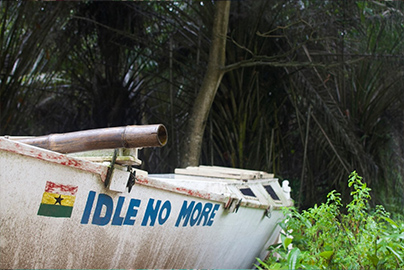 March 2023
March 2023Gaskill presents at UCSF CHESA march fellow seminar
Cameron Gaskill, M.D., Assistant Professor of Surgery and Director of Center for Global Surgery, recently delivered a lecture at the UCSF Center for Health Equity in Surgery and Anesthesia (CHESA) March Fellows Seminar titled: "Primer on Global Surgical Oncology." He discussed the challenges and opportunities presented by global surgical oncology, highlighting the importance of equitable access to care and building sustainable health systems to ensure the delivery of quality cancer surgery across the globe.
-
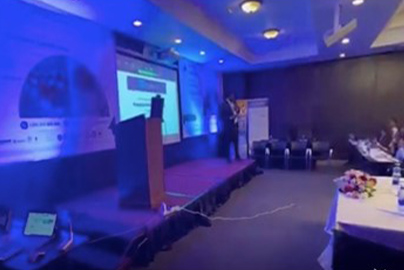 March 2023
March 2023Fostering international collaboration in liver surgery
UC Davis represents Hepato-pancreato-biliary surgery at the 1st Tanzania Liver Cancer Conference
Cameron Gaskill, M.D. presented a lecture on liver surgery at the 1st Tanzania Liver Cancer Conference held at Protea Courtyard in Dar es Salaam organized by the Tanzania Liver Cancer Group (TLCG). He discussed best practices to foster international collaboration founded on mutual respect and understanding. He also reviewed the roles of international partnerships and benefits of tri-directional collaborations.
-
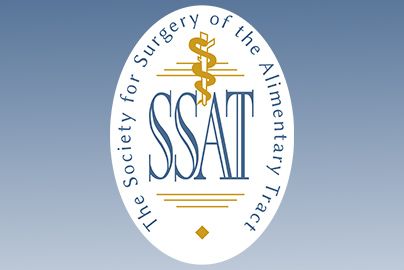 November 2022
November 2022Collaborative measure to advance global cancer care
Exploring the feasibility of a pragmatic approach: Society for Surgery of the Alimentary Tract Webinar 2023
Cameron Gaskill, M.D. participated in the webinar organized by Society for Surgery of the Alimentary Tract (SSAT) Giving Back Committee on challenges and solutions for cancer surgery in low and middle-income countries. He discussed the significance of collaborative efforts in global cancer surgical care by engaging various stakeholders from different disciplines, institutional leaders, national priorities, collaborative research, and international assistance. Furthermore, he emphasized that implementing a systematic approach will lead to the development and maintenance of cancer surgical care capacity that is effective and sustainable.
-
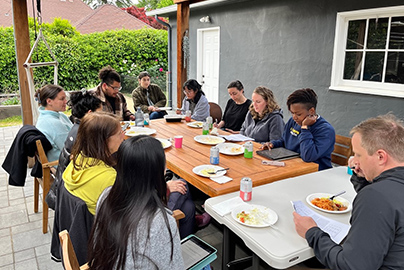 November 2022
November 2022UC Davis Health center for global surgery 2nd journal club meeting
Our May quarterly Global Surgery Journal Club focused on topics around cholecystectomy in low- and middle- income countries. Two papers were discussed; 1) Sinha et al. (2009) on the use of spinal anesthesia in laparoscopic cholecystectomy, and 2) Lombardo et al. (2018) on the cost and outcomes of open vs laparoscopic cholecystectomy in Mongolia. The group learned about the applications of spinal versus general anesthesia in laparoscopic cholecystectomy in low-resource settings and the possible implications of such practice in our healthcare system. The following discussion explored the barriers to establishing laparoscopic surgery programs in low-income countries, including training, equipment, and maintenance. The discussion shed light on the complexities of implementing surgical interventions in resource-limited settings.
-
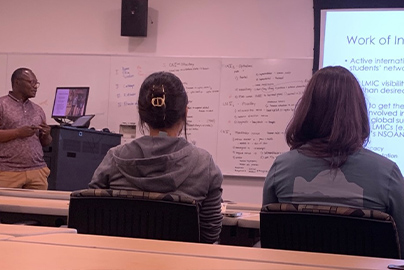 October 2022
October 2022Training the next generation of pediatric surgeons for Global Impact
Insights from Visiting Surgeon from Nigeria, Prof Emmanuel Ameh, MBBS
Renowned Pediatric Surgeon Emmanuel Ameh, MBBS, delivered an inspiring talk as a visiting professor at the UC Davis Department of Surgery. Ameh is a Professor of Pediatric Surgery at the National Hospital in Abuja, Nigeria, and also serves as the Chair of the Global Initiative for Children’s Surgery (GICS), a non-profit organization founded by Diana Farmer, M.D. and former UC Davis Surgery residents Guy Jensen and Laura Goodman. Ameh’s talk highlighted the need for more skilled surgeons in low-resource settings as well as the importance of training the next generation of surgeons to have a global perspective and to be equipped with the necessary skills to tackle the unique challenges faced in different regions of the world.
